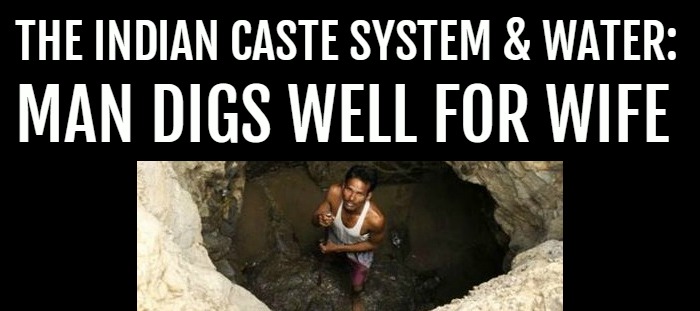19
May
The India caste system and water
Bapurao Tajne is a labourer from the Kalambeshwar village of Washim district in Maharastra. Tajne single-handedly dug a well for forty days after he and his wife was denied access to a local water source as they are both Dalit people, at the bottom of the Indian caste system.
In India, traditionally there are four principal castes, which are then divided into sub-categories. One category of people fall outside the caste system – the Dalits. Dalit literally translates as “broken” or “oppressed”, and refers to people who were once called “untouchables”, as they were outside the fourfold Hindu Varna system. Dalits are the lowest rank of Indian society and face discrimination in most aspects of their lives; education, medical facilities, employment and so forth. Whilst discrimination based on caste and acting under the principals of “untouchability” become formally illegal in 1955, the caste system retains its importance in Indian society to this day. The principles of “untouchability” and the dynamic between pollution and purity dictate what Dalits are allowed to do. There are countless restrictions on life as a Dalit, such as where they can live, sit and visit, who they can and cannot give water to, who they can eat with and who they are allowed to marry.
There are approximately 167 million Dalits in India, which constitutes over 16% of the total population. The Dalit community is divided into sub-castes. They are divided into leather workers, street sweepers, cobblers, agricultural workers (3/4 of the community) and manual ‘scavengers’ (around 1 million people). Manual ‘scavengers’ are considered the lowest and are responsible for digging village graves, disposing of dead animals, and cleaning human waste.
Bapurao Tajne decided to take matters into his own hands when he and his wife was denied access to the well due to their status as Dalits. “I don’t want to name the well owner for I don’t want bad blood in the village. However, I feel that he insulted us because we are poor and Dalits. I came home that day in March and almost cried. I resolved never to beg for water from anybody. I went to Malegaon (the closest town) and bought tools and within an hour I started digging.”
Tanje single-handedly dug a well in a location that he selected by instinct; there was no hydro-geological study to determine whether there was water in the site. Bystanders deemed him ‘crazy’ and the community openly mocked him, but he continued to dig in rocky terrain where three wells and a bore well had already gone dry. Tajne had never dug a well before, but devoted six hours a day to the task, for forty days with no assistance. He dug for four hours before leaving to work at his job, and dug for two hours after the working day. Tajne undertook back-breaking work for 14 hours a day without a break for 40 days. “It is difficult to explain what I felt in those days. I just wanted to provide water for my whole locality so that we Dalits did not have to beg for water from other castes.”
Because of Tajne’s efforts the community now has constant access to water and no-one is forced to beg. At Drop4Drop we find it unacceptable that Tajne should have to undertake this back-breaking fourty days work to supply his family with access to safe clean drinking water; something we see as a fundamental human right. Drop4drop is therefore committed to providing clean drinking water to communities in India and Africa to based on need, regardless of caste or social background.
Posted in India, News

